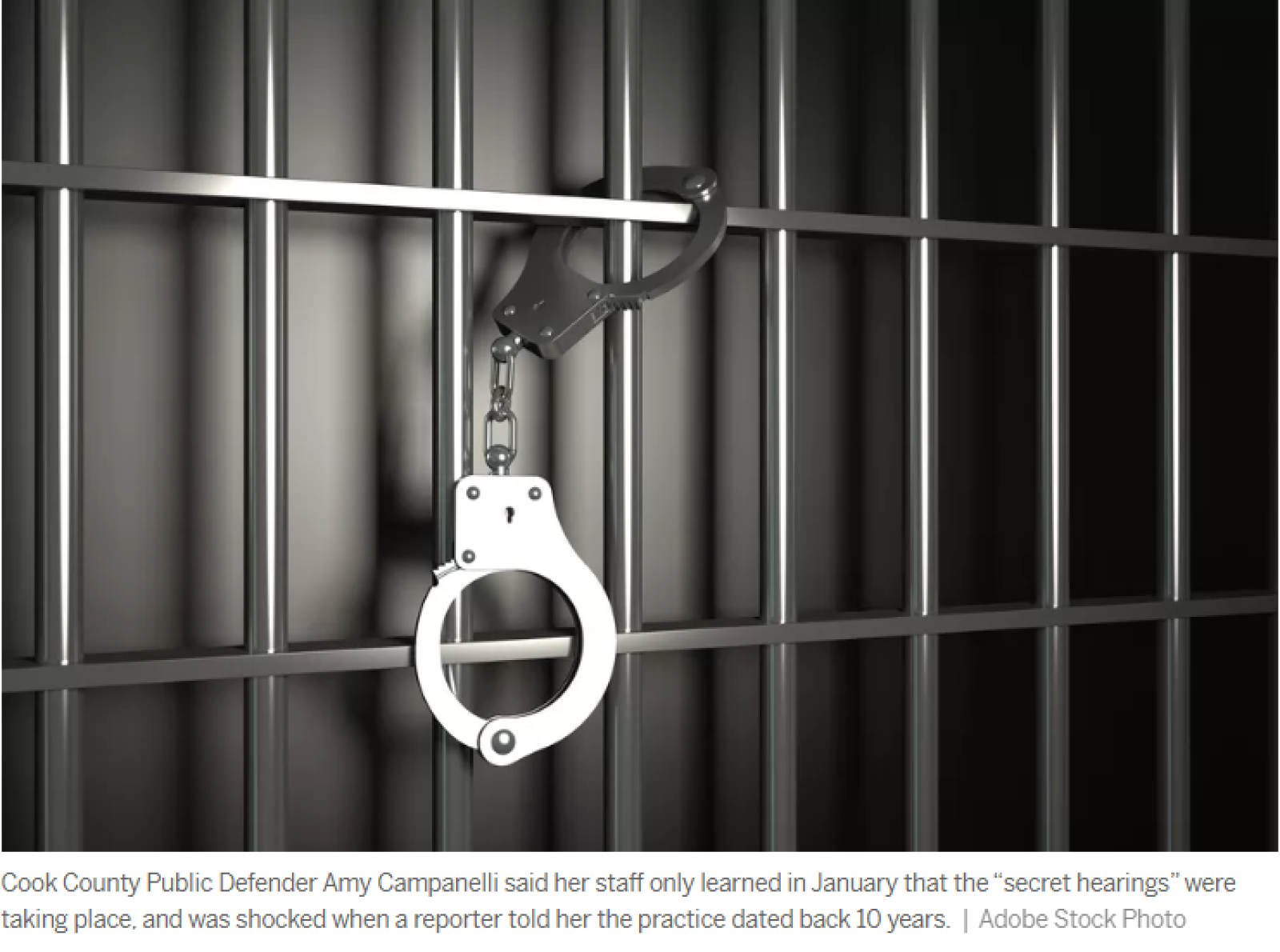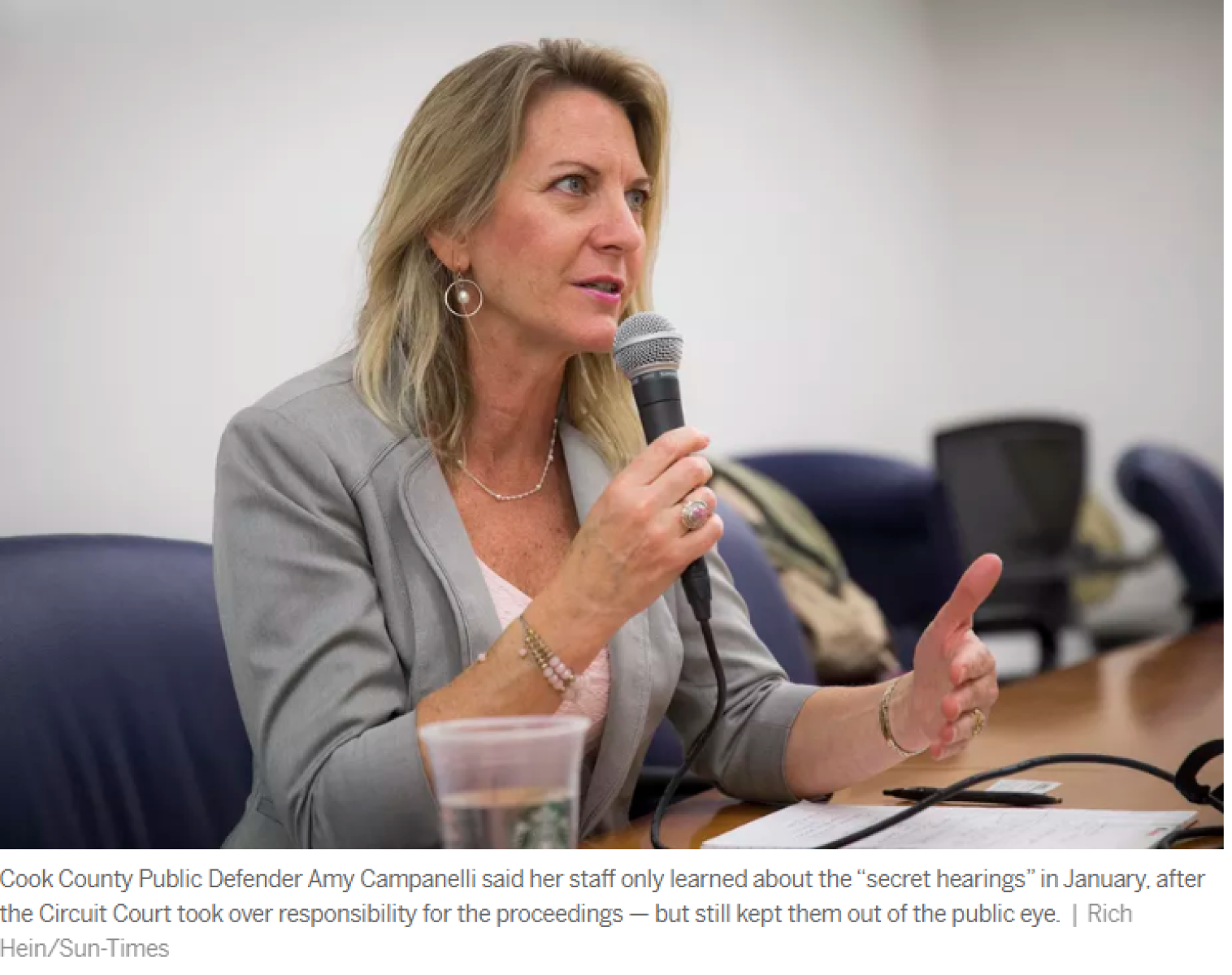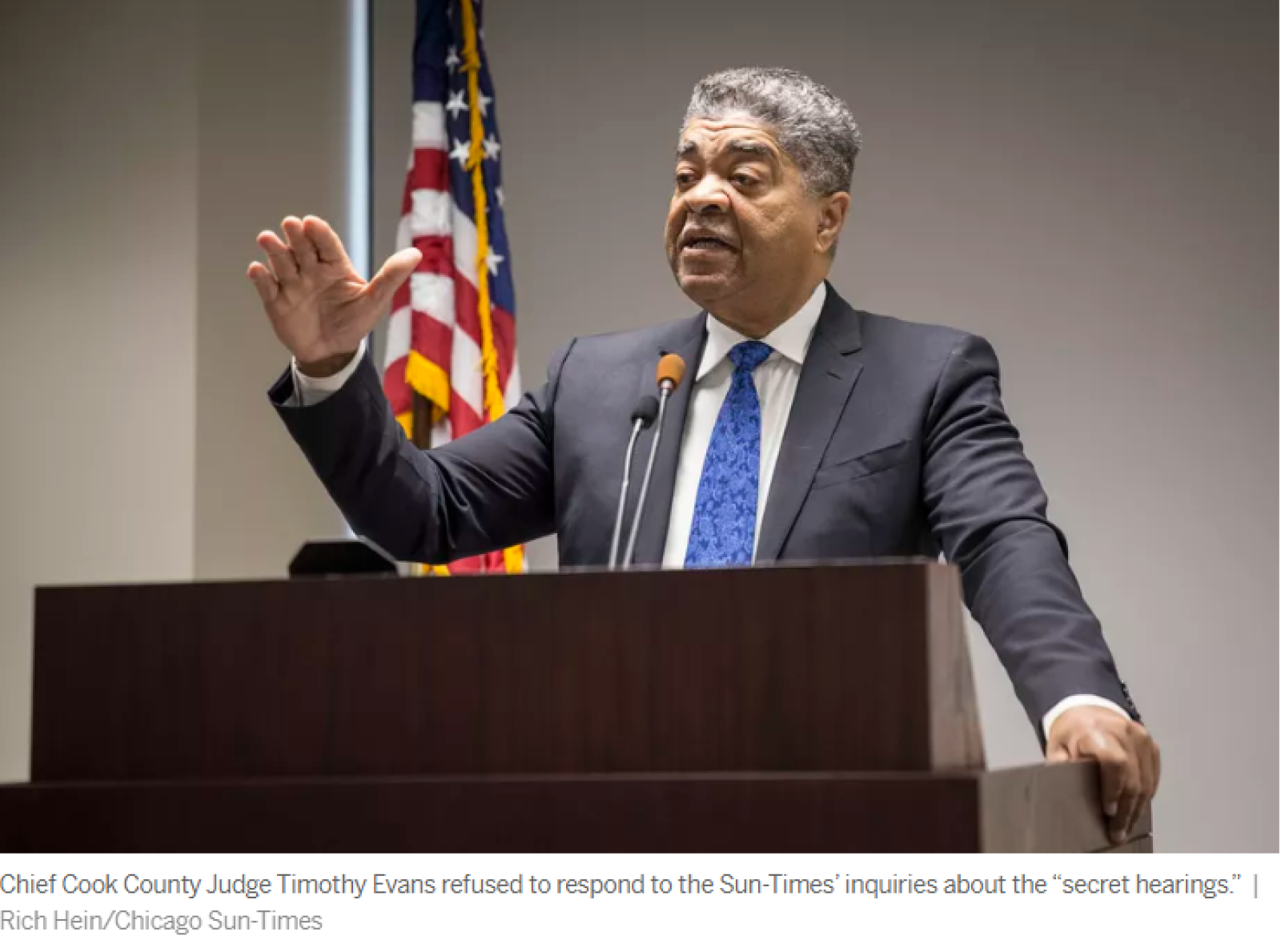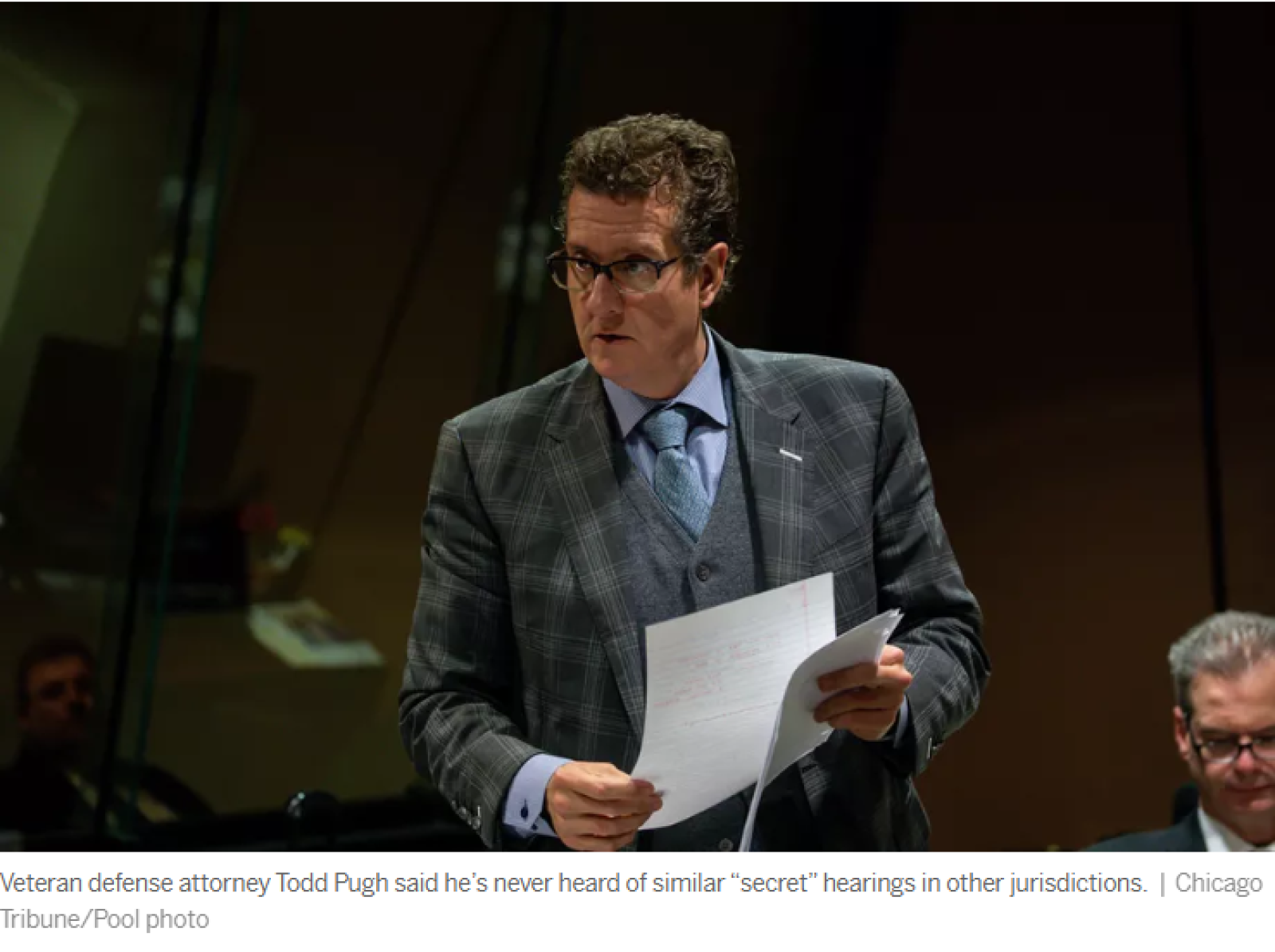
Chicago police have a “48-hour rule” when it comes to criminal suspects: 48 hours after an arrest, if they aren’t charged with a crime, the cops have to let them go.
Former Police Supt. Eddie Johnson even mentioned the policy last year when he announced charges against Jussie Smollett for allegedly staging a hate crime. Detectives had nabbed Smollett’s assailants, Abimbola and Olabinjo Osundairo, at O’Hare Airport and questioned them for 47 hours — when the brothers finally cracked and told detectives the “Empire” actor had paid them to fake the attack.
But for more than a decade, the department also has had a policy that provides a workaround to the 48-hour deadline: ad hoc, largely off-the-books “after-hours” court hearings held at courthouses adjacent to police stations — and often inside the stations themselves — that were until recently coordinated by the city Law Department, a Chicago Sun-Times investigation has found.
“These are secret hearings. There is no other word for it,” said Cook County Public Defender Amy Campanelli, whose staff only learned about the hearings in January, after the Circuit Court took over responsibility for the proceedings — but still kept them out of the public eye.
“These [hearings] are happening at night at police stations, but we know they are also happening in the middle of the day, when they could take someone into a courtroom. There is no public schedule. There is no record in the case file.”

The hearings had long been the jurisdiction of former Cook County Judge Robert Bastone, since he retired from the bench in August 2005 and immediately went to work as a civilian employee for Cook County Chief Judge Tim Evans.
Bastone — who began collecting his judicial pension that now tops $196,000 annually — was also being paid nearly $148,000 a year to coordinate the after-hours hearings, until he left the chief judge’s office on March 22, 2014.
He then got hired by Steve Patton, the city’s corporation counsel under Mayor Rahm Emanuel, charging $100 an hour to arrange the hearings until the city decided to pay him $7,000 a month, a salary Patton’s successor Ed Siskel increased to $8,000. Bastone’s contract ended Nov. 30, 2019. By that time, the city says it had paid Bastone $415,900.
Bastone, in a request to increase the budget for his fees in 2014, said he personally handled every request from the Law Department to set up a probable cause hearing, records show.
“And not one detainee has gone past 48 hours without having a detention hearing,” he wrote. “No officer or the Chicago Police Department or the city of Chicago has incurred any civil liability.”
In one email, he attached a photograph of a sheet of graphing paper on which handwritten notes indicated he had sent scores of texts, emails and made phone calls to arrange hearings. In a 2016 email, he said he’d arranged more than 608 such hearings in the previous 13 months and expected that he’d have to set up more than 800 in the coming year.
But in response to queries from the Sun-Times, Law Department staff could locate no record documenting the number of hearings Bastone had set up during his six years as a contractor.
“I don’t know why this arrangement was made. When I became aware of it, I ended it because I viewed it as a waste of money,” says Mark Flessner, City Hall’s top lawyer under Mayor Lori Lightfoot.

Bastone, who lives in Glenview, couldn’t be reached for comment. Evans refused to comment. His spokesman, Pat Milhizer, said Bastone’s role was necessary because “it was mutually convenient for the judges and law enforcement agencies to have an intermediary coordinate the scheduling.” Evans’ office was not immediately able to provide information about the number of hearings Bastone coordinated or about where or how the hearings were conducted.
In a email last year to the Law Department seeking to have his contract renewed, Bastone explained he coordinated judges and CPD officers’ meetings dating back to approximately 2004, and other emails indicate that thousands of suspects were subject to hearings in the ensuing years.
But local defense attorneys learned they were taking place only in recent weeks, as transcripts emerged of meetings held in empty courtrooms, with no lawyers present, no slot on a court calendar and little documentation they ever took place — sometimes only with a handwritten note on the bottom of a charging document.
In a series of emails exchanged with Law Department staffers this fall, Bastone, hoping the Lightfoot administration would give him another contract, could provide little documentation of what he did.
The Sun-Times has obtained transcripts from nearly 50 hearings held since December, and many show defendants spouting off, mostly expressing confusion during perfunctory hearings that in some cases last only seconds. Most hearings take no longer than a minute or two. Judges typically do not explain the charges alleged — suspects have not yet been charged at the time of the hearing — or inform suspects when they might have a chance to post bond.
In every hearing reviewed by the Sun-Times, the judge ruled that police had probable cause to hold the suspect for longer than 48 hours, even in cases where there is no record the suspect was eventually charged. After the hearings, the suspects were returned to police custody.
In one hearing held on a Sunday night in December at the police station at Belmont and Western, Maurice Humphries complained to Judge Clarence Burch.
“Excuse me, what is going on?” he asked, according to a transcript.
“I’m going to tell you in one moment. Just hold on sir. Just relax,” Burch said.
“No, I can’t relax. I’m supposed to have legal representation at any hearing I’m at . . . I feel I am being railroaded,” Humphries responded.
The transcript ends with Humphries asking what he’s being charged for.
“The detective will explain that to you, sir,” Burch said.
An order signed by Burch that night was included in the court file, stating Humphries was to be taken to the next session of bond court, though it does not list any counts in the space provided for his charge. There also is no number in the space for the case file. Humphries’ hearing took place roughly 32 hours after he was arrested, and he landed in bond court where he was held without bail the following morning, after 47 hours in custody, for allegedly stabbing a 63-year-old woman during a home invasion and robbery. He remains in Cook County Jail, awaiting trial.
Other transcripts show suspects are also held in non-violent cases, and some “after-hours” hearings took place during the business hours of the various court branches.
Todd S. Pugh, a veteran defense lawyer and member of the board of the National Association of Criminal Defense Lawyers, said he’s never heard of similar hearings taking place in any other jurisdiction. Pugh noted that the 1991 U.S. Supreme Court ruling that established the 48-hour time limit really only mandates that a judge rule on whether a suspect can be held, and while the CPD system appears to clear that low bar, the hearings show only token concern for the detainees’ rights.
“These are people that are sitting in an interrogation room, and then they’re in front of a judge, and then they go back with the same officers who have been questioning them for some indefinite period of time, and then what happens?” Pugh said. “They haven’t had a chance to talk to a lawyer. No one has explained anything to them. Do they think they’ve been charged? How does that change their response to questioning by police? I would almost rather have a client just remain in the holding cell at the station.”

If the hearings appear to only conform to the letter, if not the spirit, of due process, that is likely because they were created around the time the city paid out $16.5 million to settle a class-action lawsuit filed on behalf of hundreds of people who had been held for days under a previous CPD policy that allowed supervisors to approve keeping suspects in custody, said Mike Kanovitz, one of the lawyers who filed the suit.
Kanovitz, a civil rights attorney specializing in wrongful conviction cases, had noticed the prolonged stays in barely furnished police lockups and interrogation rooms were common in cases where suspects made confessions that eventually proved false.
“Our concern was to end the practice of police keeping people chained in a holding cell at a police station for days, basically just to sweat them,” Kanovitz said, noting the lawsuit won concessions from the department that included providing bedding for defendants held overnight.
When the CPD agreed to end the practice of holding defendants past 48 hours without bringing them in front of a judge, Kanovitz said there was no discussion of creating a new system.
The hearings seem like a waste of time at best to Campanelli and at worst, sow distrust of the legal system by being so perfunctory. Campanelli’s office has on-call lawyers who will head to police stations at any time to represent suspects who request representation, and they easily could be summoned to stand up for clients when police make their call for an on-call judge. Evans’ spokesman said state and federal law makes clear that detainees aren’t entitled to lawyers before they’re formally charged, but Campanelli disagreed.
“These hearings look like you’re in court. The judge is there. The cops are there. The court reporter is there. They may be happening in a courtroom, maybe not,” she said.
“We have courthouses all over the city. There is court going on 365 days a year. You can have these hearings in a courtroom, in front of the public and with a lawyer. There is no reason to do it this way.”
